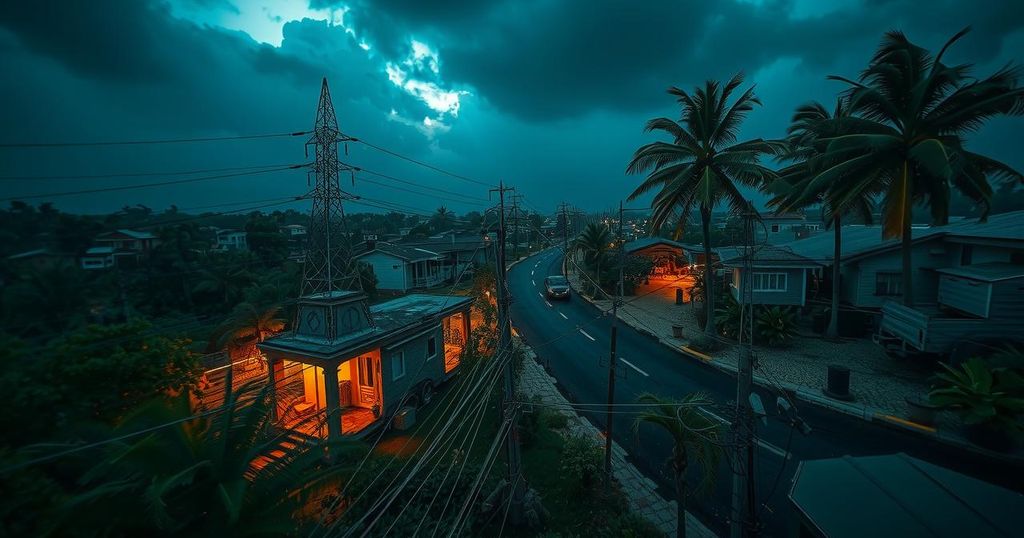Cuban Power Crisis Deepens as Hurricane Oscar Approaches
Cuba faces its third day without power as efforts to restore electricity falter amidst the arrival of Hurricane Oscar. The nation is grappling with widespread outages affecting millions due to an overloaded energy grid. Concerns are rising about access to basic necessities, and public frustration is evident as officials cite multiple factors for the ongoing crisis.
As Hurricane Oscar approaches, millions of Cubans are entering their third consecutive day without electrical power, following unsuccessful restoration efforts overnight. The Cuban Electrical Union reported that only about 16% of the nation had regained power before the frail energy grid succumbed once more to overload late Saturday. Officials have not indicated a timeline for when electricity service might be fully restored, marking this situation as the third significant collapse of the grid since Friday, resulting in widespread power outages affecting approximately 10 million residents. Compounding these issues, Hurricane Oscar, which recently made landfall on Inagua Island in The Bahamas, is expected to reach Cuba’s northeastern coast later today, bringing with it potentially damaging winds and rough surf. While initial forecasts suggest that Oscar may weaken after landfall, it could still present challenges as it moves north of the island into the central Bahamas by Tuesday. Friday marked the day of Cuba’s first complete blackout, attributed to the failure of a key power plant. Despite official claims of gradual power restoration hours after this initial incident, the nation faced another blackout by Saturday morning. These widespread outages have exacerbated an ongoing crisis for the nation, as reliable electricity is crucial for water supply and food preservation. In Havana, the scarcity of resources led to long lines at bakeries, where residents waited for hours to purchase bread. Many resorted to social media platforms like WhatsApp to share information about areas that still had electricity, and some coordinated efforts to store essential medications in temporarily functioning refrigerators or generators. While tourists continued to explore Havana in vintage vehicles, many hotels faced challenges due to fuel shortages for their backup generators, leaving Havana’s José Martí International Airport operating solely on emergency power. Reports of small protests have surfaced, with citizens expressing their frustrations about the power situation and questioning the absence of traditional ally support from countries such as Venezuela and Russia, known for offering vital oil supplies to the island. Cuban leadership has attributed the turmoil in the electricity sector to a range of factors, including heightened U.S. sanctions and the influences of recent hurricanes, all set against the backdrop of the nation’s deteriorating infrastructure. In a televised address, Prime Minister Manuel Marrero Cruz communicated the extent of the crisis, stating, “We have been paralyzing economic activity to generate (power) to the population.” Meanwhile, the Health Minister confirmed that medical facilities were reliant on generators and promised the delivery of essential health services despite ongoing power shortages.
The current power crisis in Cuba is a consequence of multiple factors, including the aging energy infrastructure, economic sanctions imposed by the United States, and adverse weather conditions that have affected energy production. These challenges have culminated in significant disruptions of the electrical grid, leading to widespread blackouts. The arrival of Hurricane Oscar is adding an additional layer of complexity to an already dire situation, threatening to worsen the current crisis. Understanding the context in which these blackouts occur is crucial for assessing the broader implications on public health, safety, and the economy in Cuba. The response of state officials, coupled with the public’s frustration, reflects a nation grappling with systemic issues while facing immediate challenges posed by natural disasters.
In summary, millions of Cubans are experiencing ongoing power outages as Hurricane Oscar approaches, exacerbating an already critical situation marked by repeated failures of the electrical grid. The government has acknowledged the complexity of the crisis stemming from infrastructure issues, external sanctions, and now the threat of a hurricane, leading to significant hardships for the population. The public response, demonstrated through long lines for essentials and protests, underscores the urgency for effective solutions to restore electricity and maintain basic services.
Original Source: www.cnn.com




Post Comment